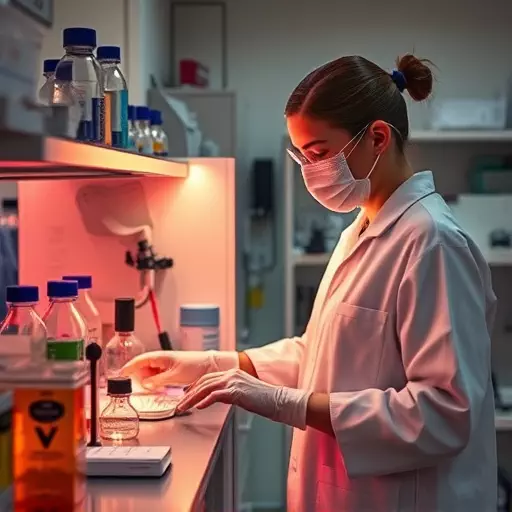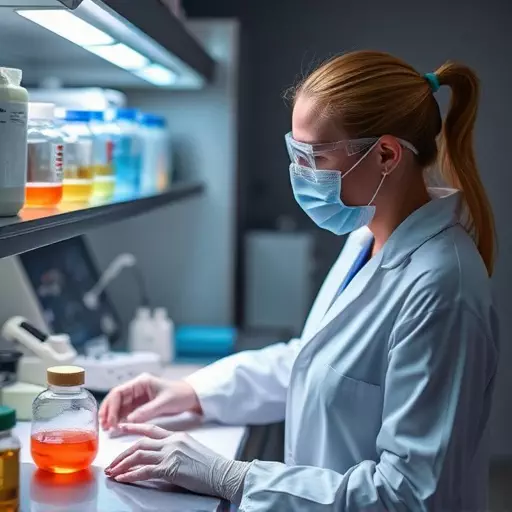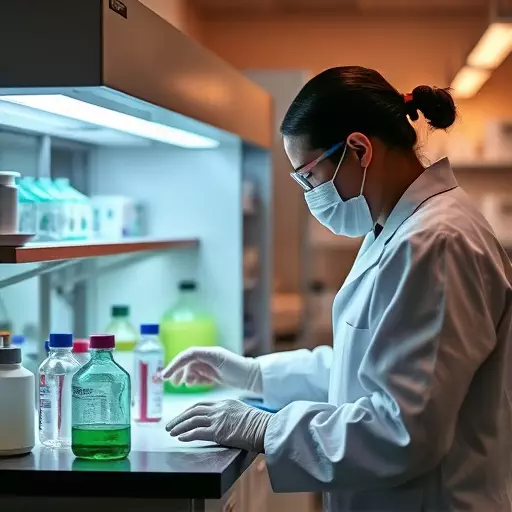In Akron, Ohio's vibrant environment and health sector, toxicology, a multidisciplinary science, is crucial for safeguarding public safety through chemical, pollutant, and contaminant analysis. A strong background in toxicology opens doors to diverse roles like hematology lab specialist or forensic laboratory analyst, with opportunities in research, analysis, and diagnostic testing. Building an educational base in Biology, Chemistry, or Forensic Science, coupled with internships or student research, prepares individuals for the challenges of lab work. Akron's scientific community fosters continuous learning. For those pursuing forensic analysis, the path offers significant impact, involving complex data interpretation and contributing to criminal investigations. Skilled lab workers are highly demanded due to evolving forensics complexities. Effective communication, technical skills, problem-solving, and staying updated on toxicological methods are key to success in environmental health labs and career advancement.
In the dynamic field of environmental health, toxicologists play a pivotal role in safeguarding our communities and ecosystems. This article explores the diverse career paths within toxicology, with a specific focus on labs in Akron. We delve into the essential duties of these professionals, from understanding complex chemical interactions to analyzing samples in high-pressure environments. The path to becoming a hematology lab specialist is outlined, along with opportunities in forensic analysis. Discover the key skills and educational requirements to embark on this rewarding career, all while navigating the day-to-day responsibilities that make toxicologists indispensable in environmental health labs.
- Understanding Toxicology and its Role in Environmental Health Labs
- Lab Work in Akron: An Overview of the Environment and Health Sector
- The Path to Becoming a Hematology Lab Specialist: Education and Training
- Exploring Opportunities in Forensic Laboratory Analysis: A Deep Dive
- Skill Sets Essential for Success in Environmental Health Toxicology
- Day-to-Day Responsibilities of a Toxicologist in an Environmental Lab
- Career Growth and Advancement in the Field of Toxicological Analysis
Understanding Toxicology and its Role in Environmental Health Labs

Toxicology, a multidisciplinary science, plays a pivotal role in environmental health labs by investigating the adverse effects of substances on living organisms. In the context of lab work in Akron or any urban center, it involves analyzing chemicals, pollutants, and contaminants to ensure public safety. Professionals in this field, often referred to as toxicologists or laboratory specialists, are equipped with knowledge in chemistry, biology, and environmental science, enabling them to conduct complex analyses.
For those aspiring to become hematology lab specialists or exploring opportunities in forensic laboratory analysis, a background in toxicology offers unique advantages. It opens doors to diverse career paths within environmental health labs, where professionals contribute to research, regulatory compliance, and public policy related to chemical safety. This field is dynamic, with ongoing advancements in analytical techniques and a constant need for experts who can interpret data and offer solutions to complex environmental health challenges.
Lab Work in Akron: An Overview of the Environment and Health Sector

Akron, Ohio, is home to a thriving environment and health sector, with numerous laboratories dedicated to ensuring public safety and environmental protection. Lab work in Akron offers a unique blend of scientific research, analysis, and diagnostic testing across various fields. For those interested in careers within these labs, the path to becoming a hematology lab specialist or exploring opportunities in forensic laboratory analysis is both rewarding and challenging.
Akron’s environmental health labs play a crucial role in monitoring air and water quality, conducting toxicological analyses, and providing critical services related to public health. With a focus on innovation and precision, these laboratories attract professionals with a strong background in chemistry, biology, and forensic science. The city’s vibrant scientific community fosters continuous learning and development, ensuring that lab technicians stay updated with the latest advancements in their field.
The Path to Becoming a Hematology Lab Specialist: Education and Training

The path to becoming a hematology lab specialist starts with a strong educational foundation. In Akron and across the nation, aspiring professionals can pursue Bachelor’s or Master’s degrees in areas such as Biology, Chemistry, or Forensic Science. These programs equip students with the necessary knowledge in cellular and molecular biology, chemical analysis, and forensic methodologies.
During their studies, future lab specialists often gain hands-on experience through internships or student research positions in environmental health labs, including those specializing in toxicology. This practical exposure is invaluable as it allows students to apply theoretical concepts to real-world scenarios, preparing them for the rigors of laboratory work in Akron and beyond. Exploring opportunities in forensic laboratory analysis broadens this experience, offering insights into the intersection of science and law enforcement.
Exploring Opportunities in Forensic Laboratory Analysis: A Deep Dive

For those interested in toxicology and environmental health, exploring career paths in forensic laboratory analysis offers a compelling avenue. These labs play a pivotal role in criminal investigations by providing critical scientific evidence. Professionals in this field, often referred to as hematology lab specialists, perform intricate analyses on various specimens to uncover significant insights that can help solve crimes.
In Akron or any metropolitan area, the demand for skilled lab workers is high due to the complex nature of modern forensics. The path to becoming a hematology lab specialist involves specialized education and training in toxicology, biochemistry, and molecular biology. This deep dive into scientific principles equips individuals to interpret complex data and deliver accurate findings, making them invaluable assets to environmental health labs and criminal justice systems alike.
Skill Sets Essential for Success in Environmental Health Toxicology

To excel in environmental health toxicology, professionals must cultivate a unique blend of technical and analytical skills. A strong foundation in lab work is essential for careers in Akron or any location, serving as the cornerstone for understanding complex chemical interactions and analyzing samples with precision. Aspiring specialists should be adept at operating various laboratory equipment and software used in environmental analysis, including tools for spectrophotometry, gas chromatography-mass spectrometry (GC-MS), and high-performance liquid chromatography (HPLC).
The path to becoming a hematology lab specialist or exploring opportunities in forensic laboratory analysis involves developing keen problem-solving abilities. Toxicologists must interpret data from diverse sources, apply scientific principles, and make critical decisions based on evidence. Effective communication skills are equally vital, as they collaborate with scientists across different disciplines and disseminate findings to stakeholders. Exploring these opportunities requires a commitment to continuous learning and staying abreast of advancements in toxicological methods and regulations governing environmental health.
Day-to-Day Responsibilities of a Toxicologist in an Environmental Lab

In an environmental health lab, a toxicologist’s day-to-day responsibilities are diverse and crucial. They begin by examining samples from various sources like water, soil, and air to identify and quantify toxic substances present. This involves sophisticated lab work in Akron or any other urban center, utilizing advanced analytical techniques such as chromatography and spectroscopy. They also collaborate with a multidisciplinary team, including chemists, biologists, and environmental scientists, to interpret data and develop strategies for mitigating chemical risks.
The path to becoming a hematology lab specialist or exploring opportunities in forensic laboratory analysis requires a strong scientific background. Toxicologists often design and conduct experiments to assess the effects of toxins on living organisms, contributing to the development of safety standards and regulations. They prepare detailed reports documenting their findings, ensuring clear communication for stakeholders involved in environmental health efforts. Their work not only protects public health but also guides policy decisions by providing critical evidence.
Career Growth and Advancement in the Field of Toxicological Analysis

In the dynamic field of toxicology within environmental health labs, career growth and advancement are often tied to specialized knowledge and hands-on experience in lab work, particularly in cities like Akron where such facilities thrive. The path to becoming a hematology lab specialist is a rewarding one; it involves rigorous training and certification in toxicological analysis, enabling professionals to play a crucial role in environmental monitoring and public health protection.
For those interested in forensic laboratory analysis, the opportunities are vast. This niche area demands expertise in deciphering chemical compounds and their effects on biological systems, contributing to criminal investigations and legal proceedings. By exploring these opportunities, individuals not only enhance their career prospects but also make significant contributions to ensuring environmental safety and justice.
